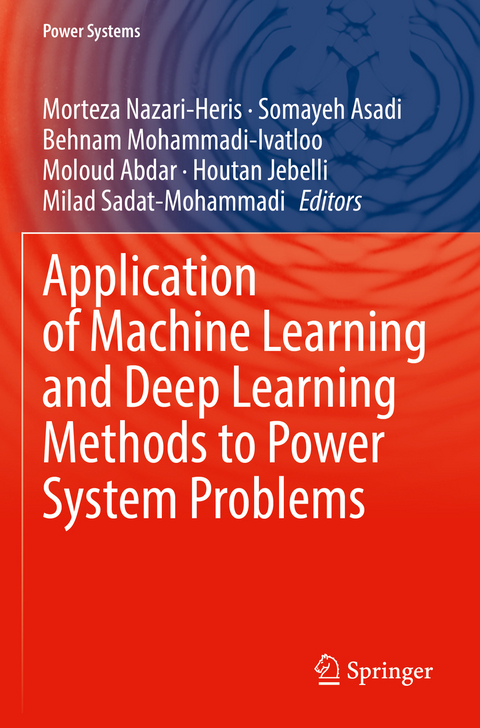
Application of Machine Learning and Deep Learning Methods to Power System Problems
Springer International Publishing (Verlag)
978-3-030-77698-5 (ISBN)
lt;p> Morteza Nazari-Heris, PhD, is a Research Assistant in the Department of Architectural Engineering at The Pennsylvania State University. He obtained BSc and MSc degrees in electrical engineering from the University of Tabriz. His main areas of interest are micro grids, smart grids, integrated heat and power networks, and energy storage technologies. He has received several awards and fellowships, including outstanding national master and PhD student, selection among the top-rated applicants from the College of Engineering in recognition of the strength of academic record, three Outstanding Thesis Awards, and selection as IEEE PES DAY 2021 Ambassador in the IEEE Section Category from Central Pennsylvania Section. He also was selected as the Architectural Engineering Outstanding Graduate Student Awards and also received the Borda Graduate Scholarship in Honor of Gifford H. Albright-Scholarly Excellence. He serves as an editor and reviewer for a number of journals and symposia and is an active member of professional communities like Institute of Electrical and Electronics Engineers (IEEE), Clean Energy Leadership Institute, and Young Professionals in Energy.
Somayeh Asadi, PhD, is an Associate Professor in the Department of Architectural Engineering at the Pennsylvania State University. She is also a Fulbright Specialist. Prior to that, she was an Assistant Professor at the Texas A&M University. She specializes in sustainable building and built environment, integrated building design systems, energy management, renewable energy systems, and smart grids. To date, her research efforts have resulted in more than 80 peer-reviewed journal articles, more than 10 book chapters, two books, and more than 60 peer-reviewed conference papers. Her research efforts include 12 externally funded projects as a PI and Co-PI, including 3 from the National Science Foundation, 3 from the Pennsylvania Department of Environmental Protection, 3 from the US Department of Energy, and 3 from Qatar National Research Foundation, resulting in more than $5 million in research project funding in total. She specializes in sustainable building and built environment, integrated building design systems, energy management, renewable energy systems, and smart grids.
Chapter 1. Power System Challenges and Issues.- Chapter 2. Introduction and literature review of power system challenges and issues.- Chapter 3. Machine learning and power system planning: opportunities, and challenges.- Chapter 4. Introduction to Machine Learning Methods in Energy Engineering.- Chapter 5. Introduction and Literature Review of the Application of Machine Learning/Deep Learning to Control Problems of Power Systems .- Chapter 6. Introduction and literature review of the application of machine learning/deep learning to load forecasting in power system.- Chapter 7. A Survey of Recent particle swarm optimization (PSO)-Based Clustering Approaches to Energy Efficiency in Wireless Sensor Networks.- Chapter 8. Clustering in Power Systems Using Innovative Machine Learning/Deep Learning Methods.- Chapter 9. Voltage stability assessment in power grids using novel machine learning-based methods.- Chapter 10. Evaluation and Classification of cascading failure occurrence potential dueto line outage.- Chapter 11. LSTM-Assisted Heating Energy Demand Management in Residential Buildings.- Chapter 12. Wind Speed Forecasting Using Innovative Regression Applications of Machine Learning Techniques.- Chapter 13. Effective Load Pattern Classification by Processing the Smart Meter Data Based on Event-Driven Processing and Machine Learning.- Chapter 14. Prediction of Out-of-step Condition for Synchronous Generators Using Decision Tree Based on the Dynamic data by WAMS/PMU .- Chapter 15. The adaptive neuro-fuzzy inference system model for short-term load, price and topology forecasting of distribution system.- Chapter 16. Application of Machine Learning for Predicting User Preferences in Optimal Scheduling of Smart Appliances.- Chapter 17. Machine Learning Approaches in a Real Power System and Power Markets.
| Erscheinungsdatum | 23.10.2022 |
|---|---|
| Reihe/Serie | Power Systems |
| Zusatzinfo | IX, 391 p. 120 illus. |
| Verlagsort | Cham |
| Sprache | englisch |
| Maße | 155 x 235 mm |
| Gewicht | 609 g |
| Themenwelt | Technik ► Elektrotechnik / Energietechnik |
| Schlagworte | artificial neural networks (ANNs) • convolutional neural network (CNN) • Deep Neural Network (DNN) • Electrical power engineering • Evolutionary-based methods • Expert Systems • Fault/Event Detection • Fuzzy Systems • Long Short Term Memory (LSTM) • Power System Planning • Power Systems • power systems modeling |
| ISBN-10 | 3-030-77698-0 / 3030776980 |
| ISBN-13 | 978-3-030-77698-5 / 9783030776985 |
| Zustand | Neuware |
| Haben Sie eine Frage zum Produkt? |
aus dem Bereich


